module3 music reading&introduction 课件
2025版高考英语总复习Module3Music练习含解析外研版必修2
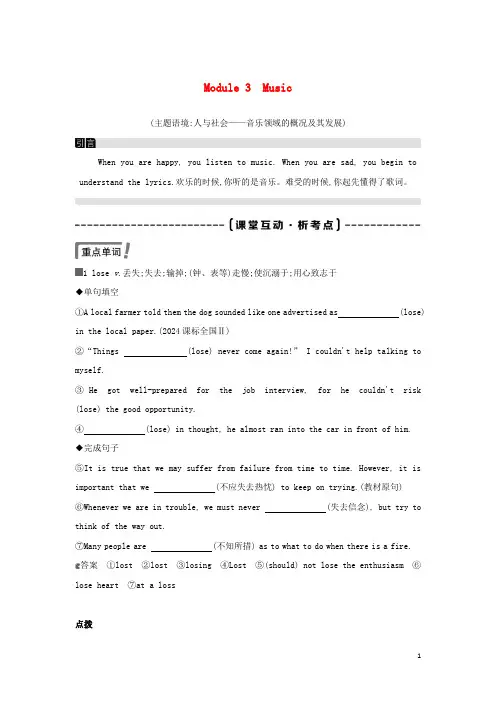
Module 3 Music(主题语境:人与社会——音乐领域的概况及其发展)When you are happy, you listen to music. When you are sad, you begin to understand the lyrics.欢乐的时候,你听的是音乐。
难受的时候,你起先懂得了歌词。
1 lose v.丢失;失去;输掉;(钟、表等)走慢;使沉溺于;用心致志于◆单句填空①A local farmer told them the dog sounded like one advertised as (lose) in the local paper.(2024课标全国Ⅱ)②“Things (lose) never come again!” I couldn't help talking to myself.③He got well-prepared for the job interview, for he couldn't risk (lose) the good opportunity.④(lose) in thought, he almost ran into the car in front of him.◆完成句子⑤It is true that we may suffer from failure from time to time. However, it is important that we (不应失去热忱) to keep on trying.(教材原句)⑥Whenever we are in trouble, we must never (失去信念), but try to think of the way out.⑦Many people are (不知所措) as to what to do when there is a fire.答案①lost ②lost ③losing ④Lost ⑤(should) not lose the enthusiasm ⑥lose heart ⑦at a loss点拨(1)lose face/heart/weight丢面子/灰心/减肥lose one's job/balance/sight/temper/way失业/失衡/失明/发脾气/迷路lose oneself in sth.=be lost in sth.用心致志于某事lose oneself in thought/(be)lost in thought陷入深思be lost for words(特别惊异、困惑等而)不知说什么才好(2)loss n.失去;丢失;损失at a loss困惑;不知所措2 influence vt.&n.影响◆单句填空①If a band is (influence) by another band, do they like them or not?(教材原句)②To test the effect of social influence eating habits, the researchers conducted two experiments.(2024新高考Ⅰ)③It is not their interest but the need of the market that (influence) students' choices of college majors.④The food choices you make the influence of alcohol are generally not very good.⑤Chaplin was not just a genius, and he was among the most (influence) figures in film history.◆完成句子⑥成就感无疑对孩子的早期教化有影响。
Module3_Music参考答案
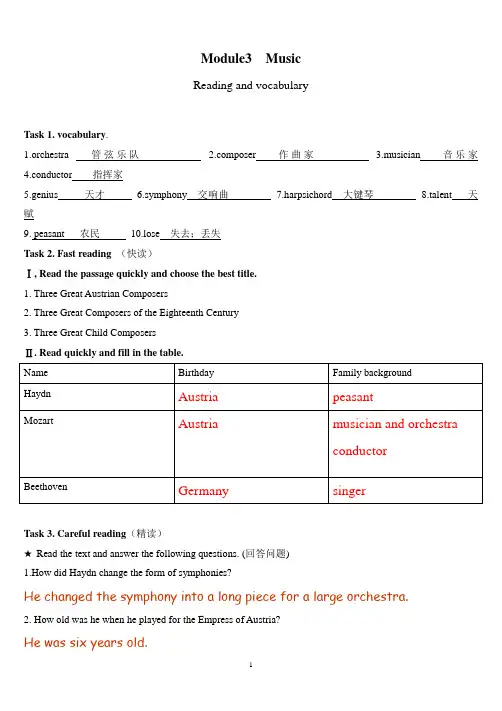
Module3 MusicReading and vocabularyTask 1. vocabulary.1.orchestra 管弦乐队poser 作曲家3.musician 音乐家4.conductor 指挥家5.genius 天才6.symphony 交响曲7.harpsichord 大键琴8.talent 天赋9. peasant 农民10.lose 失去;丢失Task 2. Fast reading(快读)Ⅰ, Read the passage quickly and choose the best title.1. Three Great Austrian Composers2. Three Great Composers of the Eighteenth Century3. Three Great Child ComposersⅡ. Read quickly and fill in the table.Task 3. Careful reading(精读)★ Read the text and answer the following questions. (回答问题)1.How did Haydn change the form of symphonies?He changed the symphony into a long piece for a large orchestra.2. How old was he when he played for the Empress of Austria?He was six years old.3.Did Beethoven stop composing when he became deaf?No, he continued composing when hebecame deaf.★ .Read carefully, and decide if these statements are true (T) or false (F).(判断正误)1. Beethoven is known as “the father of the symphony”. F (Haydn)2. When Mozart was four, he learned to play the piano. F (harpsichord)3. Mozart composed more than 600 pieces of music. T4.Mozart’s father was a peasant. F (Haydn)5. Beethoven’s mother taught him to play the piano. F (father)6. Beethoven continued composing after he went deaf. TTask 4. SummaryTask 5. Group work1. Haydn was born in a village. He is _known as the father of the symphony. He changed the symphony into a long piece for a large orchestra. After_studying music in Vienna, he went to work at the _court____ of a prince in eastern Austria. Thirty years _later_____, he moved to London, _where____ he was very successful.2. Mozart was born in Salzburg, Austria. Though he only lived 35 years, he composed __more than_______ 600 pieces of music. Mozart had musical ___talant__ from a very early age. __By the time_______ he was 14, he had composed many pieces for the harpsichord, piano and violin, _as well as_______ for orchestras.3. Beethoven was born in Bonn, Germany. When he was very young, he learned to play the violin and the piano from his father.In 1791, Beethoven met Haydn, who __met________ Beethoven to move to Vienna. Beethoven became very __popular_____ in Austria, and stayed there for the__rest_ of his life. Even after he became ____completely_____ deaf, he ________ composing.Task 6. HomeworkPlease fill the information of one of your favorites composers and then write a description of him/her. Name:Birth year:Nationality:Occupation:Specialty:Achievements:。
2020高中英语 Module3 Music Reading学案 外研版必修2
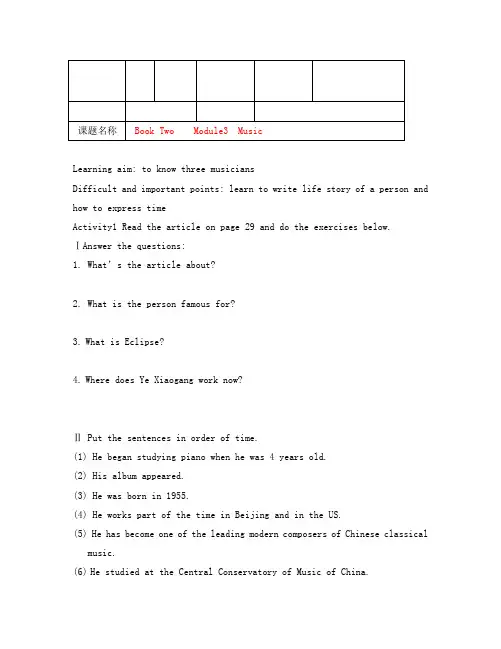
Learning aim: to know three musiciansDifficult and important points: learn to write life story of a person and how to express timeActivity1 Read the article on page 29 and do the exercises below.ⅠAnswer the questions:1. What’s the article about?2. What is the person famous for?3.What is Eclipse?4.Where does Ye Xiaogang work now?Ⅱ Put the sentences in order of time.(1) He began studying piano when he was 4 years old.(2) His album appeared.(3) He was born in 1955.(4) He works part of the time in Beijing and in the US.(5) He has become one of the leading modern composers of Chinese classicalmusic.(6)He studied at the Central Conservatory of Music of China.Ⅲ Translation:1. Ye Xiaogang, who was born in 1955, is one of a group of Chinese composers known as the New Tide.________________________________________________________________________________________________________________________昨天我们参观了一个建于1950年的博物馆。
高一英语外研版必修二module3 music reading
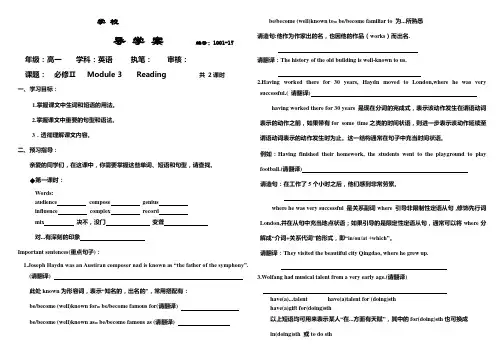
学校导学案编号:1001-17年级:高一学科:英语执笔:审核:课题:必修ⅡModule 3 Reading 共2课时一、学习目标:1.掌握课文中生词和短语的用法。
2.掌握课文中重要的句型和语法。
3.透彻理解课文内容。
二、预习指导:亲爱的同学们,在这课中,你需要掌握这些单词、短语和句型,请查找。
◆第一课时:Words:audience compose geniusinfluence complex recordmix决不,没门变聋对...有深刻的印象Important sentences(重点句子):1.Joseph Haydn was an Austiran composer nad is known as “the father of the symphony”.(请翻译)此处known为形容词,表示“知名的,出名的”,常用搭配有:be/become (well)known for= be/become famous for(请翻译)be/become (well)known as= be/become famous as (请翻译)be/become (well)known to= be/become familiar to 为...所熟悉请造句:他作为作家出的名,也因他的作品(works)而出名.请翻译:The history of the old building is well-known to us.2.Having worked there for 30 years, Haydn moved to London,where he was very successful.( 请翻译)having worked there for 30 years 是现在分词的完成式,表示该动作发生在谓语动词表示的动作之前,如果带有for some time之类的时间状语,则进一步表示该动作延续至谓语动词表示的动作发生时为止。
Module3Musici课件(外研版必修2)
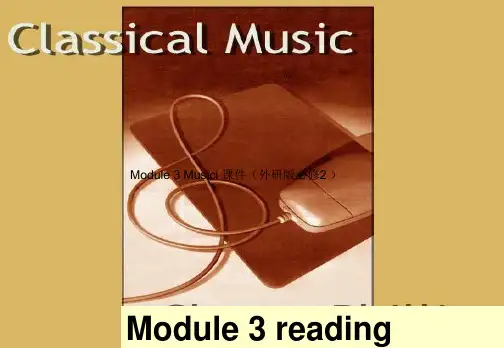
Discussion: Is it easy for a deaf person to compose music? What can you learn from his spirit? If you were him, what would you do?
His attitudes towards difficulties music life His character and willpower
He checked into a hotel room where he could continue his experiments. where This is the factory ______I used to work. I used to work in the factory which This is the factory ______ I’ve ever visited.
By the time he got there, the plane had taken off.
The new bridge _______________ by the end of had been designed last month. (design)
will have learnt2,000 By the end of next term we ____________ English words. (learn)
Musical Genius
Haydn 海顿
Father of symphonies
Mozart
Beethoven
Haydn, father of the symphony, changed the symphony into a long piece for a large orchestra _____________________
高中英语 Module 3《music》教案 外研版必修2
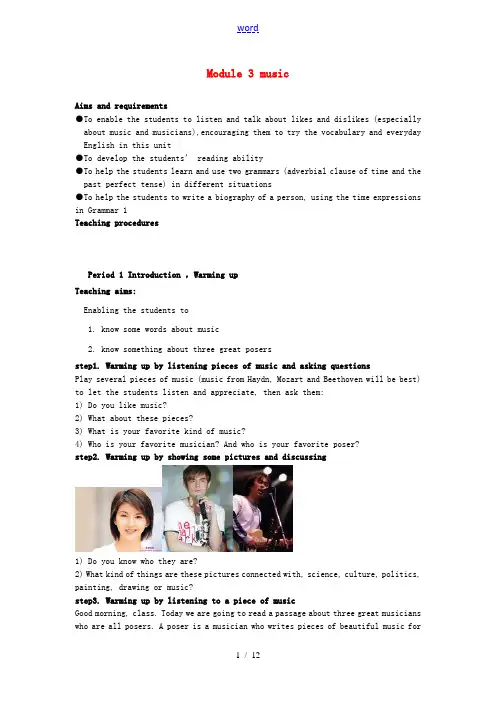
Module 3 musicAims and requirements●To enable the students to listen and talk about likes and dislikes (especially about music and musicians),encouraging them to try the vocabulary and everyday English in this unit●To develop the students’ reading ability●To help the students learn and use two grammars (adverbial clause of time and the past perfect tense) in different situations●To help the students to write a biography of a person, using the time expressions in Grammar 1Teaching proceduresPeriod 1 Introduction ,Warming upTeaching aims:Enabling the students to1. know some words about music2. know something about three great posersstep1. Warming up by listening pieces of music and asking questionsPlay several pieces of music (music from Haydn, Mozart and Beethoven will be best) to let the students listen and appreciate, then ask them:1) Do you like music?2) What about these pieces?3) What is your favorite kind of music?4) Who is your favorite musician? And who is your favorite poser?step2. Warming up by showing some pictures and discussing1) Do you know who they are?2) What kind of things are these pictures connected with, science, culture, politics, painting, drawing or music?step3. Warming up by listening to a piece of musicGood morning, class. Today we are going to read a passage about three great musicians who are all posers. A poser is a musician who writes pieces of beautiful music forothers to sing or to play. Now,let’s listen to a piece of music.(the teacher playsa piece of music ----er quan yingyue)1.do you know what kind of music it is?2.whose work is it?3.what kind of music is it?4.what is your feeling after listening to it?Step 4 show the following picturesAnd make the students familiar with these new words:Piano violin saxphone drum erhu guitarste p4.now please match these musical instruments with their names.Step 5 work in groups to discuss these questions:1.which of the instruments do you like listening to?2.which famous musicians play them?3.is the chinese instruments different from the other instruments?describe thedifference,if there is one.Step6 summary and homework:Today we’ve learnt the Introduction,know something about music,and we’ve also learnt some new words.The homework:1.Try to instruct your favorite musician to your class orally.2.Learn the new words again, using the dictionary if necessaryPeriods 2 Reading and VocabularyTeaching Aims:Train the students' reading ability.Learn some useful words and expressions.Teaching Important Points.Help the students to understand the passage better.Learn and master some important words and phrases in this period.Teaching Difficult Points:How to help the students improve their reading and understand the passage better. Teaching Methods:Fast reading to get the general idea of the text.Careful reading to understand the passage better.Discussion to help the students understand what they've learned better. Teaching procedure.Step 1 Lead --inThe teacher may play a kind of music written by Beethoven.------- What kind of music do you think it?----- Who do you know wrote it ?The teacher may discuss the questions and answer them freely.T: As we know, there are various kinds of music around the world. They all have their own obvious characteristic. And also there were famous posers such as Joseph Haydn, Mozart, and Beethoven. Today we may learn of their life from the text.Step 2 Reading prehension.Fast reading: Read the passage quickly and choose the best title.A.Three Great Austrian posers.B.Three Great poser of the eighteenth Century.C.Three Great Child posers.Key: B.Now let's read the passage again, underline new words in the text and decide whether the following statements are right or not.1.The three posers were all born in Austria.2.Mozart had a beautiful singing voice.3.Mozart died before his fortieth birthday.4.Beethoven once worked at the court of a prince, who began to go deaf when he grew older.5.Beethoven had ever met Haydn, but he didn't think he taught him a lot.6.Both Haydn and Mozart had fathers who were musicians.Key:1.F Beethoven was born in Bonn, Germany.2.F. Haydn had a good singing voice.3.T4.F. Haydn once worked at the court of a prince, but he didn't go deaf.5.T6.F. Haydn was the son of a peasant( The teacher may begin with the T/F questions orally and this is a good time to test their listening abilities as well as their prehension of the text. )Step 3 Read and listen to the passage. Meanwhile, some more questions are waiting for you.1.How did Haydn change the form of symphonies?2.How long did he work in eastern Austria?3.How many pieces of music did Mozart pose?4.How old was he when he played for the Empress of Austria?5.How long were Mozart and Haydn friends?6.Who taught Beethoven how to play the piano?7.Did he stop posing when he became deaf?Keys:1 He changed the symphony into a long piece for a large orchestra.2. 30 years.3.More than 600 pieces of music.4. When he was 6 , he played the harpsichord in a concert for the Empress of Austria.Periods 3, Function and GrammarTeaching aims:1 To learn grammar rules2 To use the grammar rules for correct munication3 To study co-operatelyTeaching important points: To use the correct tense and the proper conj. Teaching difficult points: To use correctly the two tenses and the three conj. Teaching methods: Explanation and practiceTeaching procedure:Step Ⅰby telling the class what happened to the Shenzhou Ⅻlot in the area of.Shenzhou Ⅻand the whole nation were waiting and I came back home fromschool and heard the news, I couldn’t help getting exciteed. I feelproud of our country.Step Ⅱ Grammar 11 Make sentences with “when , while, e in , have a lesson〞( Here is a picture of a classroom and a student ing in)A When he came in, we were having a lesson.B When we were having a lesson, he came in.C While we were having a lesson, he came in.2 Say the meaning of “as〞 in the following sentences.D As he was a child, he studied drawing.E As he grew older, he began to go deaf.F He listened to music as he walked.当…之时随着一边…一边…3Answer the three questions.When we talk about a single event in the past,we use when as in A .When we talk about a period of time in the past,we use when/ while / asas in B C D.We use as to refer to a progressive change as in E F .4Practiceplete the following sentences with “when ,while , as〞(1) ___she was studying at school, she also sang in the school choir.(2) ___he was living in Vienna, he studied music.(3) ___she met bach,she was only 20 years old.(4) ___he grew older, he found it more difficult to pose music(5) ___he was playing in the orchestra, he met his wife.(6) ___he was working in Hollywood, he became ill and died.(7) ___I listened to the violin solo, I fell in love with classical music.(8) ___they toured Europe for 10 years, they finnally decided to live inAustrilia.Step Ⅲ Grammar 2 The past perfect tense1Read the following sentences and summarise rules, paying attention to tenses. Fill in the blanks.After Liping had finished doing his homework, he turned on the TV.After they had got everything ready, they began to do the experiment.Before he came to our school, he had taught English for several years.Before his letter reached me, I had received his telephone call.They had finished the project by last month.I had left the country by the time the letter reached me.had done before diddid after had donehad done by did/past time2 PracticeWorkbook Grammar (2)(3)(4)plete the sentences using the verbs in brackets and the past simple or past perfect tense.Step Ⅳ1 Game Oral practice ,pair work.Ask and answer questions using all kinds of tenses.Example:-- When did you have your breakfast this morning?-- At 6.-- Have you prepared for the English lesson?-- Yes, I have. I have finished the exercises in the workbook.2 Watch a vedio play.Step Ⅴ Sum upAsk some students to make sentences using “when, while, as, before, after, by〞. Step Ⅵ Homework: Present a biography of a famous Chinese musician or poser.Periods 4 Speaking and WritingTeaching Aims:1.Knowledge and Skilla.To develop speaking ability by talking about likes and dislikes.b.To learn about some vocabulary and knowledge related to music and posers.c.To develop writing ability by presenting a biography of a famous Chinesemusician or poser.d.Train the ability of collecting and dealing with information, and developtheir abilities of getting new information, munication and cooperation.2.Emotion and Valuesa.To raise students’ interests in science and form the right attitude towardsall kinds of music.b.To help them know Chinese traditional music well and cultivate their interestin playing some Chinese instrument.3. Character-building:a.To make them know how to enjoy different kinds of music.b.Arouse their interest of playing some kinds of instrument and enrich theirleisure time.4. Cross-cultural awarenessa.To help them know the difference between China and some western countries ininstruments.b.Cultivate their awareness of cultural munication through the speciallanguage—music.Difficulties and Importance:a.To make the students understand and grasp the vocabulary and knowledge relatedto music.b.To enable the students to know how to use adverbial clause of time. Teaching Method:a.Task-based methodologyb.municative ApproachTeaching Procedures:Step 1 Pre-readingLook at the picture and answer the following questions.1.Who is he?2.Have you ever know something about him?Step 2 While-readinga. SkimmingRead the passage quickly, and make a note of some basic information about Ye xiaogang.Suggested answers:b. Detailed readingRead the passage carefully and fill in the blanks with proper words. Find what Ye Xiaogang did or what happened to him in the following years:Suggested answers:Step 3. Post-readingDiscussion.1.Are there any similarities between Ye Xiaogang and the European posers you haveread about in this module?2.Do you think it is a good idea to mix Chinese and western music?Step 4 Everyday Englisha. Listen to two people talking about the way they listen to music and answer the questions.1.How do they listen to it?2.Are they happy with the way they listen to music?3.What does Anna offer to do for Tom?b. work in pairs. Discuss your favourite music and how you listen to it.Step 4 Guided writingWrite a short passage of a famous singer in China—Han Hong.The following words may help you:1. sing well successful song writer2.born in1971 in Tibet(某某)3. young watch her mother sing and dance4. at the age of nine professional(专业的) training in Beijing.5. in 1985 her first national prize6. write songs in 19937. song Hometown number one in ChinaHomework:1.Finish writing the biography of Han Hong—a famous Chinese singer.2.Finish other exercises in this module.Periods 5 culture cornerTeaching aims:Enabling the students to1. to know sth about Ye Xiaogang2. write a biography of a famous Chinese musician or poser.Teaching steps:I. Ask some students to say something about Mozart.Give as many details as possible. II. Try to think of a Chinese musician or poser, eg. Xu Peidong.Gather these materials.1. when, where and in what kind of family he/ she was born.2. how he/ she spent his/ her childhood or youth.3. about his/ her education4. what are his/ her famous works5. what his/ her style is / wasGroup work. Ask the students to discuss about the musician or poser.Then ask some students to stand up to say sth. about the musician or poser.Correct the mistakes if any.III. Cultural Corner.Ye Xiaogang1. Listen to the passage and try to find the answer to this question:When did his album Horizon appear? (in 1986)2. Read the passage thoroughly and make a note of the information about Ye Xiaogang.Name:_________________ Sex: __________________Nationality:_____________ Job:___________________Main achievements: ____________________________________________Style of music: ____________________________What he did or happened to him in the following years:1955: ___________________________________________From 1978 to 1983: ___________________________________________1985: ___________________________________________1986: ___________________________________________1996: ___________________________________________3. Check the answers with the whole class. Then ask one or two students to say sth about Ye Xiaogang with the help of the notes made.4. Language points:1) work as2) leading modern posers 主要作曲家leading article 社论the leading cause 主要原因a leading role 主角3) mix A with B= mix A and B togethermix win with waterNever mix with such people.mix up 弄混,弄错It’s mon to mix him up with his brother.弄乱mix up the papersmix up those data4) receive many prizes5) part ofIV. Homework:Write a short passage about the Chinese musician or poser we talked about this period.。
外研版必修二 Module 3 music Period 2 Reading and vocabulary导学案
Module 3 Music Period 2 Reading and vocabularyTeaching aims and demands:1.To train the students’ reading ability.2.To learn some useful words and expressions.Important and difficult points:1.To help the students understand the passage better.2.To master the uses of the important words, phrases and sentences.Teaching methods:The efficient “6+1” :1. Fast reading to get the general idea of the passage.2. Careful reading to understand the passage better.3. Discussion to help the students understand what they’ve learnt better.Teaching aids:Multi-media; a blackboard; a learning guide etc.【导学流程】:☆☆Leading-in1. Read the following words aloud:court宫廷director 指挥genius天才lose丢失musical音乐的peasant 农民symphony交响乐talent 天赋Austria奥地利Austrian奥地利的prince王子compose 作曲tour巡回演出harpsichord拨弦古钢琴impressed印象深的piece(of music )乐章singer歌唱家successful成功的teenager青少年2. Listen and guess:What kind of music do you think it is?Who do you think writes it?☆☆【了解感知】Read the passage quickly and choose the best title. (Activity 2 Page 22)1. A. Three Great Austrian ComposersB. Three Great Composers of the Eighteenth CenturyC. Three Great Child Composers2 Divide the text into three parts and give them a small title.Part 1 (Paragraph ___-___) _________________.Part 2 (Paragraph ___-___) __________________.Part 3 (Paragraph___-___) ___________________.☆☆【深入学习】1.Careful reading— Activity 3 Page 231)._______________ were born in Austria?2).________________ was born in Germany?3). ________________had a good singing voice?4). ________________died before his fortieth birthday?5). ________________became deaf?6). ________________met each other?7). _______________had fathers who were musicians?8). _______________had a father who wasn’t a musician?2. Careful reading—filling in the three charts☆☆【迁移运用】Reading expression -Activity 4 on P231.How did Haydn change the form of symphonies? (within 10 words)_____________________2. How long did he work in eastern Austria? (within 2 words)_____________________________3. How many pieces of music did Mozart compose? (within 5 words)_______________________4. How old was he when he played for the Empress of Austria? (one word)___________________5. How long were Mozart and Haydn friends? (within 2 words)____________________________6. Who taught Beethoven how to play the piano? (within 2 words)__________________________7. What happened to him when he grew older? (within 6 words)___________________________。
Module 3 MusicIntroduction and reading
Beethoven: 1770 Germany, grew old, began to go deaf, continued composing Symphony
Name
Jay Zhou
Birthplace
中国台湾
Birthday
1979年1月18日
Title
音乐天才
achievement来自1.小时候就有音乐才华 2.现在是著名的歌手,成功的曲作家 3.把中国传统音乐与R&B结合起来 4.获得许多奖项 中国功夫、篮球;各种乐器
注意乐器前面的冠词规则:
西方乐器前加冠词
中国乐器前不加冠词 play the violin / piano
play erhu / pipa
Answer questions about musical instruments : 1.Which instruments are used in pop and rock music? piano, drum, guitar, saxophone 2. Which instruments are used in jazz? drum, piano, violin, saxophone 3.Which instruments are used in traditional Chinese music? erhu, drum, pipa, flute
orchestra
a large group of musicians who play on musical instruments
a person who writes music
someone who stands in front of a group of musicians or singers and directs their playing or singing.
Module 3-Music-必修2-外研版-英语
Period One │ 重点难点
重点难点
重点 Ask the students to finish the questionnaire on Page 25 to talk about their likes and dislikes about music in groups. 难点 Enable the students to discuss how to listen to music.
Unit 1 │ 美文欣赏 美文欣赏
What is music? Suppose you hit a woodenIt makes a sound. Now suppose you hit a ball. It makes a sound. The second sound is called a tone (乐音). A tone is a single musical sound. Music is the art of organizing tones into meaningful patterns of sound. We might call it the language of tones. Sometimes the language of music speaks to us in tones sounding after one another in melody (旋律). Or the tones could be sounding together in harmony (协调).
Period One
Period One
Reading and speaking
Period One │ 三维目标
三维目标
Knowledge and skills (1)Get the students to learn and grasp the following important useful new words and expressions: pop(popular music)流行乐 rock(rock and roll)摇滚乐 jazz爵士乐 blues布鲁斯 classical music古典音乐 hip-hop说唱音乐 light music轻音乐
外研版英语Bo2Module3MusicReading阅读
约瑟夫·海顿(1732—1809), 奥地利著名作曲家,维也纳古典 乐派的最早期代表,被称为“交 响乐之父”。在一生中共完成了 107首交响曲,68首弦乐四重 奏,62首钢琴奏鸣曲,和45首 钢琴三重奏,14部弥撒,24出 歌剧,以及两部神剧等作品。
海顿家境贫困,但父母都酷爱音乐。小海顿自 幼就在家庭中接受音乐教育,6岁时成为海茵堡教会 合唱团的歌童,并开始学习钢琴和小提琴。可是直到 29岁才被艾斯德哈济亲王聘为乐长。后来,海顿两次 去英国伦敦旅行,演出了他专门创作的十二首交响乐 (后人称它《伦敦交响乐》),获得牛津大学音乐博士 称号,从此名震全欧洲。
large orchestra. After_s_t_u_d_y_in_g_ music in Vienna, he went to work at the
_c_o_u_r_t of a prince in eastern Austria. Thirty years _l_a_te_r_, he moved to London, w__h_e_re_ he was very successful.
Haydn met Mozart and was very _im__p_r_e_s_se_d_ with him. They were friends
_u_n_ti_l__ Mozart’s death.
Beethoven was born in Bonn, Germany. When he was very young, he learned to play the violin and the piano _fr_o_m__ his father. In 1791, Beethoven met Haydn, who e_n_c_o_u_r_a_g_e_d_ Beethoven to move to Vienna. Beethoven became very p_o_p_u__la_r_ in Austria, and stayed there for the _r_e_st_ of his life. Even after he became c_o_m__p_l_et_e_l_y deaf, he c_o_n_t_in__u_e_d composing.
- 1、下载文档前请自行甄别文档内容的完整性,平台不提供额外的编辑、内容补充、找答案等附加服务。
- 2、"仅部分预览"的文档,不可在线预览部分如存在完整性等问题,可反馈申请退款(可完整预览的文档不适用该条件!)。
- 3、如文档侵犯您的权益,请联系客服反馈,我们会尽快为您处理(人工客服工作时间:9:00-18:30)。
Module Three Music
Vocabulary
Module Three Music
Let’s meet some new words about music!
• Jobs related to music
• Instrument
• Type of music
by Mozart when
he first met him.
Beethoven was born in Bonn, Germany. He showed a
talent for music when he was young. In his twenties, he
met both Mozart and Haydn. However, it waswHhoaydn (8)
三、运用练习
根据课文中对于人物描写的学习,对人物描述进行练习。
Leehom Wang
Nie Er
someone who stands in front of a group of musicians or singers and directs their playing or
singing.
Module Three Music
orchestra n.
A large group of musicians who paly a variety of different instruments togeter.
Module Three Music
Singer n.
Someone who sings songs
Module Three Music
choir n.
A group of people sing together
Module Three Music
composer n.
Person who writes music
Module Three Music
Lang Lang A Bin(Hua Yanjun) Chopin
Person who plays a musical instrument or composes music
Musician n.
as their job.
Module Three Music- Instrument
5. Who taught Beethoven how to play the piano?
It was his father, who was a singer.
6. Where did Beethoven spend the rest life? In Vienna.
Module Three Music Summary:
Question1 Question 2
Question 3 Question 4 Question 5 Question 6
Haydn Mozart Beethoven
Para 1-2 Para 3-4 Para 5-6
Module Three Music
Read the text again, and fill in the blanks with proper words or phrases.
Three Great Austrian Composers Three Great Composers of the Eighteenth Century Three Great Child Composers
Module Three Music
Read the article carefully, and answer the following questions.
Who is he? How much do you know about him?
Module Three Music
How about this handsome man? How much do you know about him?
Module Three Music
How about this strict man?
3. How old was Mozart when he played for the Empress of Austria?
He was 6.
Module Three Music
4. How long were Mozart and Hayden friendes?
For about 10 years.
Module Three Music
By the time he was (6)fourteen, Mozart had composed many
pieces for the harpsichord, piano and violin as well as for
impressed
orchestras. Haydn was deeply (7)
Module Three Music
Look at the pictures and read the article as quick as you can and try to use one sentence to give the main idea of it!
Module Three Music
Module Three Music
of all time;peasant;musical;impressed;where;who; Austria;as;fourteen;go deaf
Haydn,the
father
of
the
symphony,
was
the
son
ห้องสมุดไป่ตู้
of
a
peasant
(1)
He changed the symphony into a long piece for a large
Date and place of birth Family background
Aspects:
Education Work experience Success/achievements
People You Can Choose
Name:
Ma Yun
Bill Gates
Han Han Scarlett Johansson
classical jazz pop rock symphony
《天鹅湖》 rich and beautiful in melodies; 《惊愕交响曲》last longer
《有你的快乐》 《迷宫》
gentle; sad; slow
《泡沫》 《小苹果》
be common in melodies and stories
saxphone n.
Module Three Music- Instrument
violin n.
Module Three Music- Instrument
harpsichord n.
Module Three Music- Type of Music
Type Example
Charactor
encouraged him to move to Vienna. (9)As he grew older,
he began to (1go0)deaf . But he continued composing.
Module Three Music
After Reading
Module Three Music
orchestra. Having worked inAeusatsritaern (2)
for 30 years,
Haydn movedwthoerLe ondon, (3) he was very successful.
Mozart was a composer, possibly the greatest musical genius (4)of all tim.eHe had (5) musical talent from a very early age.
drum n.
Module Three Music- Instrument
erhu n.
Module Three Music- Instrument
Guitar n.
Module Three Music- Instrument
piano n.
Module Three Music- Instrument
Hometown:
Hangzhou
Washington Shanghai
New York
Parents:
Workers
Lawyer
Editor
Worker
Achievements:
founder of TaoBao The richest man Writer Famous actress
Module Three Music
Module Three Music
1. Why was Hayden known as “the father of symphony”? Because he Changed symphony into a long piece for a large orchestra.
2. What did Hayden’s father do? He is a Peasant (farmer).
《新长征路上 的摇滚》崔健
Strong in temples; shows singer’s atittude
《第九(合唱)
交响曲》 《第五(命运) always played by orchestra
交响曲》
Module Three Music
